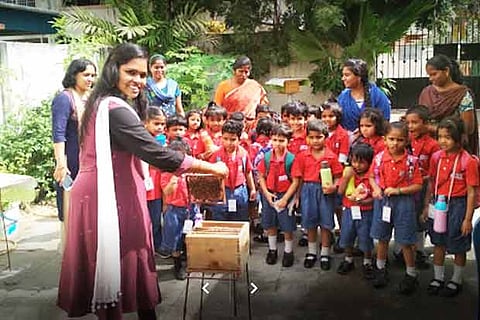Honey, what’s the buzz in Tamil Nadu? Beekeeping
Chennai
Honey is one of nature’s finest creations that’s loaded with medicinal and nutritional properties. Though there are a lot of commercial brands that sell processed honey, nothing comes close to organic honey produced in Tamil Nadu. Beekeeping plays a crucial role in sustaining this and the government is lending support to people wishing to pursue bee farming in the state. Apiculturists and nature conservationists discuss with us the benefits of bee farming and why more individuals should come forward for it.
Josephine Arokiya Mary, a National Award winner for apiculture, is one of the prominent faces in the beekeeping industry. “I learned bee harvesting from a university in Madurai. Through the National Horticulture Mission (NHM) scheme, I got 62 boxes and later started farming in a bigger way. Honey is a superlative healing food that has powerful cancer-killing properties. I didn’t know all those details back then. After realising its medicinal properties, I started conducting workshops in Madurai,” she tells DTNext.
Known as Queen Bee in her hometown in Madurai, she offers 25 varieties of honey with flavours like jamun, neem, tulsi and amla, among others. Apparently, Josephine is the first person in the state to take honey from jamun. “There are many schemes from the government for farmers/individuals who take up bee farming. But people aren’t interested because of various reasons. So far, I’ve trained more than 60,000 people from various parts of the state in bee harvesting under the National Honey Mission. From handling the bees to extracting the honey and maintaining the bee boxes, I give people a deeper idea of the whole process. My aim is to create ‘golden revolution’ — I wanted every individual to have at least one box in their house,” she explains.
An author of three books on beekeeping, Josephine harvests honey from more than 10 varieties of bees. “It’s a viable business for women — not much labour involved and does not require a huge investment. After my husband and daughter passed away, I realised the importance of being financially independent. Presently, I have 6,000 bee boxes with a storage capacity for 5,000 to 6,000 kg of bees,” she adds.
L Usha quit her job in am MNC and became a beekeeper after realising the value of honey and bee venom therapy. “I’ve been running beekeeping workshop in the city and at Tamil Nadu Agricultural University (TNAU) for the past three years. To be honest, the queen bee (mother of all the bees in the colony) is my inspiration to take up bee farming. They are the best pollinators in the world,” says Usha, who harvest from 200 bee boxes at her farm in Madipakkam.
Bees are important to pollinate crops that produce our food. If the plant is not pollinated it will not produce food. “Pollination helps trees give more produce. If there is a bee box close to any tree that bears fruit, the tree produces more yield than an average tree. Another benefit of bee farming is apitherapy (bee venom therapy) that is slowly gaining attention in our state. This therapy treats various neurological and immunological ailments,” she says.
Unlike the southern districts, awareness of beekeeping is less in north Tamil Nadu. “I organise workshops for adults and children and encourage them to start beekeeping on a smaller scale. Moreover, we need to save bees from extinction,” adds Usha.
Conservation scientist Dr A Kumaraguru wants to promote awareness of the importance of bees for food security. “The pollinators play a major role in our food system and food security. It’s scientifically proven that bees double the yield of farming. I think less awareness is the primary reason that stops farmers from taking up beekeeping,” he says.
Krishnamurthy Sanaparatti Palanisamy quit his job and became a bee keeper. In a previous interview to DTNext, he said, “One feels a sense of ownership; one learns the business from top to toe, and to manage it. It took nearly a year for me to understand all the nuances of beekeeping. I had lost more than 65 per cent of my bees to disease, but steadily the numbers improved and I recovered them all. I direct the honey bees to a particular flora and collect honey from the same flora in order to produce unifloral honey, namely drumstick, coriander, glory lily, mango, sesame, jamun, sunflower, banana and neem.”
Visit news.dtnext.in to explore our interactive epaper!
Download the DT Next app for more exciting features!
Click here for iOS
Click here for Android

